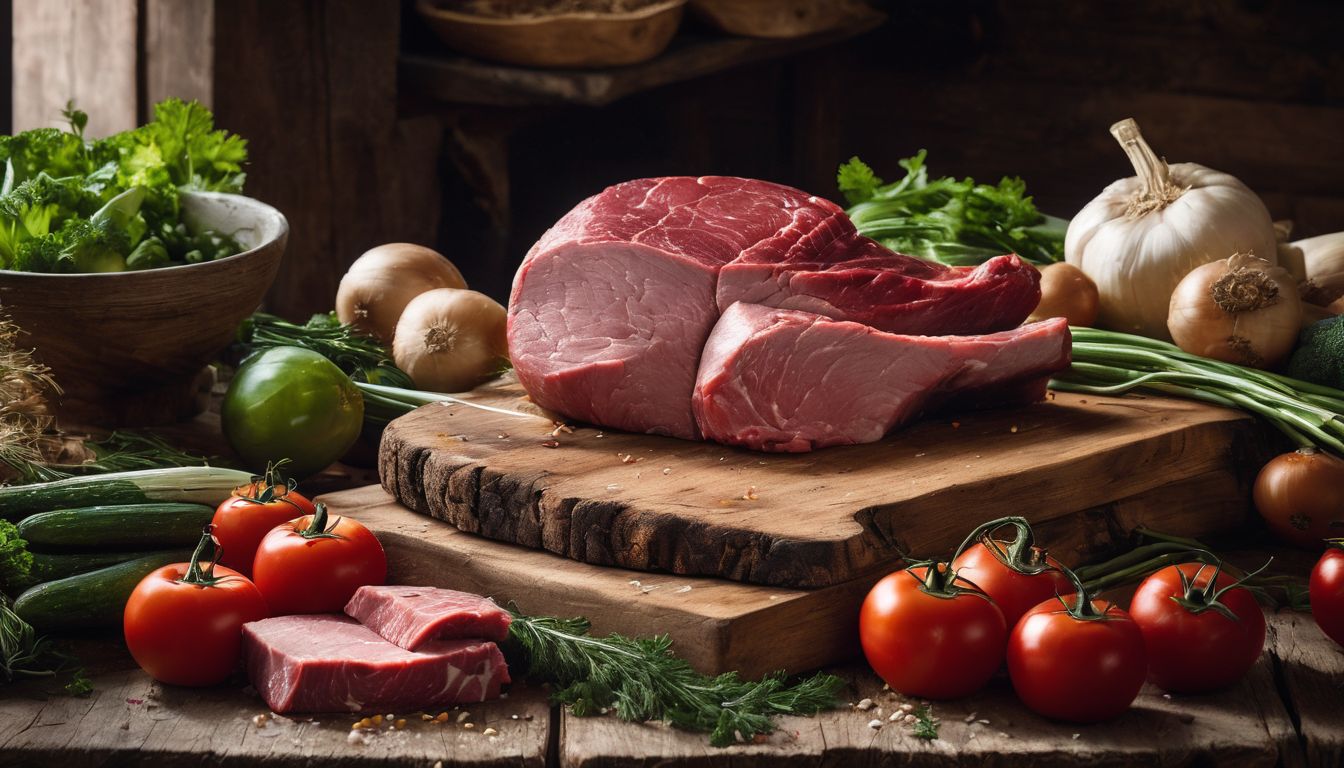More and more people are looking for ways to eat responsibly without compromising on taste. The plant-based meat alternative market has skyrocketed, now valued in the billions. Our blog will guide you through what these meatless wonders are made of, why they’re gaining traction, and the hurdles they face.
“Let’s dig in!” beckons an exploration into a sizzling topic!
Key Takeaways
- Plant – based meat alternatives, often made from ingredients like soy and pea protein, offer the taste and texture of real meat with added health benefits such as lower saturated fat levels.
- Choosing these alternatives can help reduce environmental impacts due to a smaller carbon footprint and less resource-intensive production processes compared to traditional meat.
- The growing plant – based market faces challenges including the need for clear labeling standards, regulations regarding terms like “meatless”, and securing funding for further research and development.
- These non – meat products not only cater to vegetarians or vegans but also those interested in reducing their ecological footprint while still enjoying familiar foods.
- As technology advances, we may see even more realistic plant – based options becoming available which could disrupt the traditional meat industry by offering more sustainable choices.
What are Plant-Based Meat Alternatives?
Plant-Based Meat Alternatives are products made from plants that mimic the taste, texture and appearance of real meat. They come in various forms such as burgers, sausages, nuggets and ground meat substitutes.
Definition
Plant-based meat alternatives are products designed to mimic the taste, texture, and nutritional value of animal meat whilst being made entirely from plants. They include a variety of ingredients such as soya, peas, beans, and wheat to create meat-like experiences for those who choose not to consume animal products.
These vegan meat substitutes offer a sustainable option for individuals looking to reduce their environmental footprint without giving up the flavours they love.
Alternative protein sources like these have revolutionised the way we think about food by providing non-meat alternatives that cater to vegetarians, vegans or anyone interested in plant-based diets.
Lab-grown meat and cell-cultured options are also emerging as part of this category; however, they differ because they involve actual animal cells multiplied outside an animal’s body.
The industry aims to deliver diverse choices tailored for people passionate about conservation and seeking environmentally friendly ways to enjoy traditional dishes.
Types
Plant-based meat alternatives come in various forms and types to cater to different culinary needs and preferences. Here are the main types of plant-based meat products:
- Burgers: These are popular alternatives to traditional beef burgers and come in a variety of flavors and textures, offering a similar experience to real meat.
- Sausages: Plant-based sausages provide a versatile option for grilling, frying, or adding to casseroles, with a taste and texture that mimics traditional sausages.
- Nuggets: Plant-based nuggets offer a satisfying alternative to chicken nuggets, often made from ingredients such as soy or pea protein, designed to replicate the taste and texture of poultry.
- Ground Meat: Plant-based ground meat serves as a versatile substitute in recipes like tacos, Bolognese sauce, or meatloaf, providing an alternative option for those seeking a similar cooking experience.
- Deli Slices: These are slices of plant-based meat that can be used as sandwich fillings or added to salads, providing an alternative to traditional deli meats without compromising on flavor or texture.
- Prepared Meals: Plant-based prepared meals include options like lasagna, shepherd’s pie, or stir-fries made with alternative meat products for convenient and quick meal solutions.
Taste and Texture of Plant-Based Meat
Plant-based meat alternatives are designed to mimic the taste and texture of real meat, using ingredients like pea protein, soy protein, or wheat gluten. Many consumers find that plant-based meats are indistinguishable from real meat in taste and texture, making them a popular choice for those looking to reduce their meat consumption.
Comparison to real meat
When considering plant-based meat alternatives, understanding how they compare to real meat in terms of taste and texture is crucial for the environmentally conscious consumer. Here’s a simple breakdown in an easy-to-digest table format:
| Aspect | Plant-Based Meat | Real Meat |
|---|---|---|
| Taste | Engineered to mimic meat flavours; Continuously improving | Distinct, traditional flavours depending on the meat type |
| Texture | Designed to resemble meat; Can vary between brands | Varied textures; Includes muscle fibers and fat |
| Ingredients | Combination of plant proteins, fats, and flavourings | Primarily animal muscle tissue |
| Processing | Highly processed to achieve desired qualities | Minimal processing, unless for processed meat products |
| Health Impact | Often lower in saturated fats and cholesterol | Contains essential nutrients but can be high in fats |
| Environmental Impact | Typically lower carbon footprint and resource usage | Higher greenhouse gas emissions and resource-intensive |
Innovations in the food industry strive to close the gap between these alternatives and real meat, catering to those who prioritize environmental conservation.
Ingredients and processing
Plant-based meat alternatives often use a variety of ingredients, such as soy protein, pea protein, wheat gluten, and other plant-based sources. These ingredients are processed using techniques like extrusion, pressing, or 3D printing to mimic the texture and appearance of real meat.
Natural flavors and seasonings are added to enhance taste and create a sensory experience similar to traditional meat products. The processing methods aim to replicate the fibrous structure of animal muscle tissue, resulting in products that closely resemble the texture of conventional meats while providing high-quality plant-based protein.
To meet consumer demand for healthier options without compromising on taste and texture, manufacturers continue to innovate with new ingredient combinations and advanced processing technologies.
Reasons for the Rise in Popularity
The rise in popularity of plant-based meat alternatives can be attributed to the health benefits they offer, such as lower cholesterol and saturated fat content. Additionally, their positive environmental impact and ethical considerations have led to increased consumer interest in these products.
Health benefits
Plant-based meat alternatives offer several health benefits, including lower levels of saturated fat and cholesterol. They are also rich in plant-based protein, fiber, vitamins, and minerals.
Consuming these alternatives can contribute to reducing the risk of heart disease, high blood pressure, and certain types of cancer. Additionally, plant-based meats are free from hormones and antibiotics commonly found in traditional animal products.
The consumption of plant-based meat substitutes has been linked to better weight management due to their lower calorie content compared to real meat. These alternatives provide a healthy choice for individuals seeking a balanced diet with reduced intake of processed meats.
Environmental impact
The environmental impact of plant-based meat alternatives is significant. Production of these products generally requires less water and land use compared to traditional meat production, reducing the strain on natural resources.
Additionally, plant-based meat alternatives generate fewer greenhouse gas emissions, contributing to efforts to combat climate change. By choosing these options, individuals can support conservation and reduce their ecological footprint.
Consumers’ acceptance of plant-based meat can lead to a decrease in demand for animal-based products, which in turn reduces deforestation and habitat destruction for livestock farming.
Ethical concerns
Ethical concerns surrounding plant-based meat alternatives revolve around the treatment of animals in traditional meat production. The rise in popularity of these alternatives reflects a growing concern for animal welfare within the environmentally conscious community.
Many individuals choose plant-based options to reduce their impact on animal suffering, aligning with their conservation and ethical values.
Consumer acceptance of plant-based meat also stems from considerations about the environmental impact of traditional meat production. These choices demonstrate a desire to contribute positively towards sustainability and conservation efforts.
Obstacles and Challenges
Fair labeling and regulation of plant-based meat alternatives present a challenge, as there is currently no standard definition for terms like “meatless” or “plant-based.” Additionally, securing funding for research and development in this emerging industry can be difficult.
Fair labeling and regulation
To ensure consumers make informed choices, clear and accurate labelling regulations are crucial for plant-based meat alternatives. Regulations should require transparent disclosure of ingredients and the specific processes used to produce these products, providing clarity on whether they are genetically modified or contain any allergens.
Consistent standards across all regions will help build consumer trust and facilitate fair competition within the industry.
Regulations also play a critical role in preventing misleading claims that could confuse consumers about the nutritional content or environmental impact of plant-based meat alternatives.
Funding for research and development
To advance plant-based meat alternatives, funding for research and development is crucial. Investment in this area can lead to the discovery of new ingredients, improved processing techniques, and enhanced taste and texture.
Additionally, funding allows for more extensive studies on the environmental impact of plant-based meats, further solidifying their benefits over traditional meat products.
Furthermore, adequate financial support enables scientists to address challenges such as fair labeling and regulation. It also paves the way for innovation in creating sustainable and affordable plant-based protein sources.
The Future of Plant-Based Meat
The future of plant-based meat holds potential for growth and innovation in the food industry. As technology advances, there is a possibility for further development and improvement of plant-based meat alternatives, which may have a significant impact on the traditional meat industry.
Potential for growth and innovation
Plant-based meat alternatives hold tremendous potential for growth and innovation in the food industry. With increasing consumer acceptance and demand, companies are investing heavily in research and development to enhance taste, texture, and nutritional value of plant-based products.
The advancement of technology is driving innovation in creating more realistic meat substitutes, such as cell-cultured meat or lab-grown protein, offering environmentally friendly alternatives to traditional animal farming.
This evolving landscape of alternative protein sources has the potential to revolutionise the way we produce and consume food.
Furthermore, the ongoing commitment from both established food companies and start-ups towards developing plant-based options indicates a promising future for sustainable meat alternatives.
Impact on the meat industry
The rise of plant-based meat alternatives is set to have a significant impact on the meat industry. As consumer acceptance of plant-based meat grows, traditional meat producers are likely to face increasing competition from non-meat alternatives.
The growing popularity of plant-based burgers and vegan meat products could lead to a reduction in demand for traditional meat products, influencing the dynamics of the meat substitute consumption and ultimately shaping the future landscape of the industry.
Furthermore, as environmentally conscious individuals continue to support conservation efforts by choosing plantbased protein over animal-derived options, we can expect an ongoing shift in consumer preferences that will further challenge the dominance of conventional meat production.
Other ways to reduce meat consumption
To reduce meat consumption, consider incorporating more plant-based proteins into your diet.
- Experiment with recipes using tofu, tempeh, or seitan as meat substitutes.
- Explore a variety of legumes such as lentils, chickpeas, and beans to create satisfying and nutritious meals.
- Incorporate whole grains like quinoa, brown rice, and barley into your diet to add substance to your dishes.
- Embrace a wider range of fruits and vegetables to diversify your meals and increase your intake of essential vitamins and minerals.
Conclusion
In conclusion, the rise of plant-based meat alternatives is reshaping the food industry. Consumers are embracing these options due to their health and environmental benefits. With ongoing advancements in technology and consumer acceptance, plant-based meats are poised for continued growth and innovation.
As demand increases, so does the potential for a significant impact on traditional meat production.
FAQs
1. What are plant-based meat alternatives?
Plant-based meat alternatives are nonmeat options like meatless burgers and vegetarian meats, crafted mainly from plants for those seeking meatfree substitutes.
2. Why is there a rise in the popularity of plant-based meat?
The rise in the popularity of plant-based meats is due to consumer acceptance of these products and environmental benefits, as they offer a more sustainable alternative to traditional meats.
3. Are cell-cultured meats the same as plant-based meats?
No, cell-cultured or cultured meats are grown in labs from animal cells, while plant-based meats come from plants and do not involve animal cells.
4. Can you list some advantages and disadvantages of choosing plant-based meat over traditional meat?
Advantages include lower environmental impact and new varieties available; disadvantages could encompass taste differences compared to real meat for some consumers.
5. Is it possible that one day the majority might switch to eating plantbased burgers instead of beef burgers?
With growing interest in environmental issues and health trends favoring nonmeat alternatives, it’s quite possible that many people might opt for plantbased burgers over traditional beef ones.





